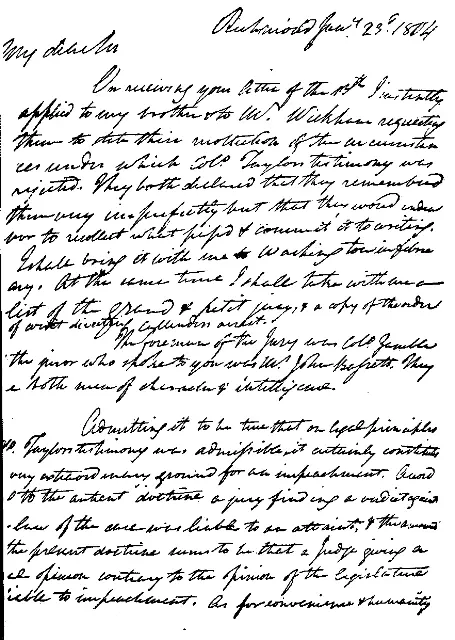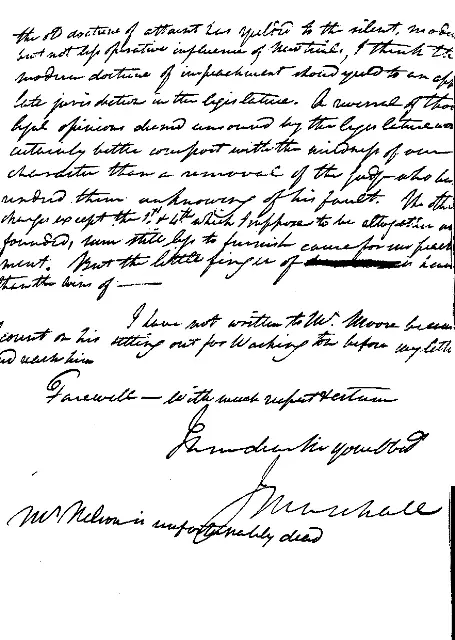Albert Beveridge - The Life of John Marshall, Volume 3 - Conflict and construction, 1800-1815
Здесь есть возможность читать онлайн «Albert Beveridge - The Life of John Marshall, Volume 3 - Conflict and construction, 1800-1815» — ознакомительный отрывок электронной книги совершенно бесплатно, а после прочтения отрывка купить полную версию. В некоторых случаях можно слушать аудио, скачать через торрент в формате fb2 и присутствует краткое содержание. Жанр: foreign_prose, foreign_antique, Биографии и Мемуары, foreign_language, на английском языке. Описание произведения, (предисловие) а так же отзывы посетителей доступны на портале библиотеки ЛибКат.
- Название:The Life of John Marshall, Volume 3: Conflict and construction, 1800-1815
- Автор:
- Жанр:
- Год:неизвестен
- ISBN:нет данных
- Рейтинг книги:4 / 5. Голосов: 1
-
Избранное:Добавить в избранное
- Отзывы:
-
Ваша оценка:
- 80
- 1
- 2
- 3
- 4
- 5
The Life of John Marshall, Volume 3: Conflict and construction, 1800-1815: краткое содержание, описание и аннотация
Предлагаем к чтению аннотацию, описание, краткое содержание или предисловие (зависит от того, что написал сам автор книги «The Life of John Marshall, Volume 3: Conflict and construction, 1800-1815»). Если вы не нашли необходимую информацию о книге — напишите в комментариях, мы постараемся отыскать её.
The Life of John Marshall, Volume 3: Conflict and construction, 1800-1815 — читать онлайн ознакомительный отрывок
Ниже представлен текст книги, разбитый по страницам. Система сохранения места последней прочитанной страницы, позволяет с удобством читать онлайн бесплатно книгу «The Life of John Marshall, Volume 3: Conflict and construction, 1800-1815», без необходимости каждый раз заново искать на чём Вы остановились. Поставьте закладку, и сможете в любой момент перейти на страницу, на которой закончили чтение.
Интервал:
Закладка:
Burning with anger, a young Republican member of the Maryland Legislature, John Montgomery, who had listened to this judicial tirade, forthwith savagely denounced Chase in the Baltimore American . 467He demanded that the Justice be impeached and removed from the bench. 468Montgomery hastened to send to the President 469a copy of the paper.
Jefferson promptly wrote Nicholson: "Ought this seditious and official attack on the principles of our Constitution, and on the proceedings of a State, go unpunished? And, to whom so pointedly as yourself will the public look for the necessary measures?"
But Jefferson was not willing to appear openly. With that uncanny power of divining political currents to which coarser or simpler minds were oblivious, he was conscious of the uneasiness of Northern Republicans over ruthless impeachment and decided not to become personally responsible. "For myself," he cautioned Nicholson, "it is better that I should not interfere." 470
Upon the advice of Nathaniel Macon, 471Republican Speaker of the House, Nicholson concluded that it would be more prudent for another to take the lead. It was well understood that he was to have Chase's place on the Supreme Bench, 472and this fact would put him at a disadvantage if he became the central figure in the fight against the aged Justice. The procurement of the impeachment was, therefore, placed in the eager hands of John Randolph, that "unusual Phenomenon," as John Adams called him, 473whose lust for conspicuous leadership was insatiable.
The Republican managers had carefully moulded public opinion into the belief that Chase was guilty of some monstrous crime. Months before articles of impeachment were presented to the House, ex parte statements against him were collected, published in pamphlet form, and scattered throughout the country. To assure wider publicity all this "evidence" was printed in the Republican organ at Washington. The accused Justice had, therefore, been tried and convicted by the people before the charges against him were even offered in the House. 474
This preparation of the popular mind accomplished, Chase was finally impeached. Eight articles setting forth the Republican accusations were laid before the Senate. Chase was accused of everything of which anybody had complained since his appointment to the Supreme Bench. His conduct at the trials of Fries and Callender was set forth with tedious particularity: in Delaware he had stooped "to the level of an informer"; his charge to the grand jury at Baltimore was an "intemperate and inflamatory political harangue"; he had prostituted his "high judicial character … to the low purpose of an electioneering partizan"; his purpose was "to excite … odium … against the government." 475
This curious scramble of fault-finding, which was to turn out so fatally for the prosecution, was the work of Randolph. When the conglomerate indictment was drawn, no one, except perhaps Jefferson, had the faintest idea that the Republican plan would miscarry; Randolph's multifarious charges pleased those in Virginia, Pennsylvania, Delaware, and Maryland who had first made them; they were so drawn as to lay a foundation for the assault which was to follow immediately. "These articles," wrote John Quincy Adams, "contained in themselves a virtual impeachment not only of Mr. Chase, but of all the Judges of the Supreme Court from the first establishment of the national judiciary." 476
In an extended and carefully prepared speech, Senator Giles, who had drawn the rules governing the conduct of the trial in the Senate, announced the Republican view of impeachment which, he said, "is nothing more than an enquiry, by the two Houses of Congress, whether the office of any public man might not be better filled by another." Adams was convinced that "this is undoubtedly the source and object of Mr. Chase's impeachment, and on the same principle any officer may easily be removed at any time." 477
From the time the House took action against Chase, the Federalists were in despair. "I think the Judge will be removed from Office," was Senator Plumer's opinion. 478"The event of the impeachment is already determined," wrote Bayard before the trial began. 479Pickering was certain that Chase would be condemned – so would any man that the House might impeach; such "measures … are made questions of party , and therefore at all events to be carried into effect according to the wishes of the prime mover [Jefferson]." 480
As the day of the arraignment of the impeached Justice approached, his friends were not comforted by their estimate of the public temper. "Our public … will be as tame as Mr. Randolph can desire," lamented Ames. "You may broil Judge Chase and eat him, or eat him raw; it shall stir up less anger or pity, than the Six Nations would show, if Cornplanter or Red Jacket were refused a belt of wampum." 481
When finally Chase appeared before the bar of the Senate, he begged that the trial should be postponed until next session, in order that he might have time to prepare his defense. His appeal fell on remorseless ears; the Republicans gave him only a month. But this scant four weeks proved fatal to their purpose. Jefferson's wise adjustment of the greatest financial scandal in American history 482came before the House during this interval; and fearless, honest, but impolitic John Randolph attacked the Administration's compromise of the Yazoo fraud with a ferocity all but insane in its violence. Literally screaming with rage, he assailed Jefferson's Postmaster-General who was lobbying on the floor of the House for the passage of the President's Yazoo plan, and delivered continuous philippics against that polluted transaction out of which later came the third of John Marshall's most notable opinions. 483
In this frame of mind, nervously exhausted, physically overwrought and troubled, the most brilliant and effective Congressional partisan leader of our early history came to the trial. Moreover, Randolph had broken with the Administration and challenged Jefferson's hitherto undisputed partisan autocracy. This was the first public manifestation of that schism in the Republican Party which was never entirely healed.
Such was the situation on the 4th of February, 1805, when the Senate convened to hear and determine the case of Samuel Chase, impeached by the House for high crimes and misdemeanors, to settle by the judgment it should render the fate of John Marshall as Chief Justice of the United States, and to fix forever the place of the National Judiciary in the scheme of American government.
"Oyez! Oyez! Oyez! – All persons are commanded to keep silence on pain of imprisonment, while the grand inquest of the nation is exhibiting to the Senate of the United States, sitting as a Court of Impeachments, articles of impeachment against Samuel Chase, Associate Justice of the Supreme Court of the United States." 484
So cried the Sergeant-at-Arms of the National Senate when, in the Chase trial, John Marshall, the Supreme Court, and the whole National Judiciary were called to judgment by Thomas Jefferson, on the bleak winter day in dismal, scattered, and quarreling Washington. An audience crowded the Senate Chamber almost to the point of suffocation. There were present not only the members of Senate and House, the officers of the Executive departments, and the men and women of the Capital's limited society, but also scores of eminent persons from distant parts of the country. 485
LETTER TO SAMUEL CHASE ( Facsimile )


Among the spectators were John Marshall and the Associate Justices of the Supreme Court, thoroughly conscious that they, and the institution of which they were the highest representatives, were on trial almost as much as their imprudent, rough, and outspoken fellow member of the Bench. It is not improbable that they were helping to direct the defense of Chase, 486in which, as officials, they were personally interested, and in which, too, all their convictions as citizens and jurists were involved.
Читать дальшеИнтервал:
Закладка:
Похожие книги на «The Life of John Marshall, Volume 3: Conflict and construction, 1800-1815»
Представляем Вашему вниманию похожие книги на «The Life of John Marshall, Volume 3: Conflict and construction, 1800-1815» списком для выбора. Мы отобрали схожую по названию и смыслу литературу в надежде предоставить читателям больше вариантов отыскать новые, интересные, ещё непрочитанные произведения.
Обсуждение, отзывы о книге «The Life of John Marshall, Volume 3: Conflict and construction, 1800-1815» и просто собственные мнения читателей. Оставьте ваши комментарии, напишите, что Вы думаете о произведении, его смысле или главных героях. Укажите что конкретно понравилось, а что нет, и почему Вы так считаете.












